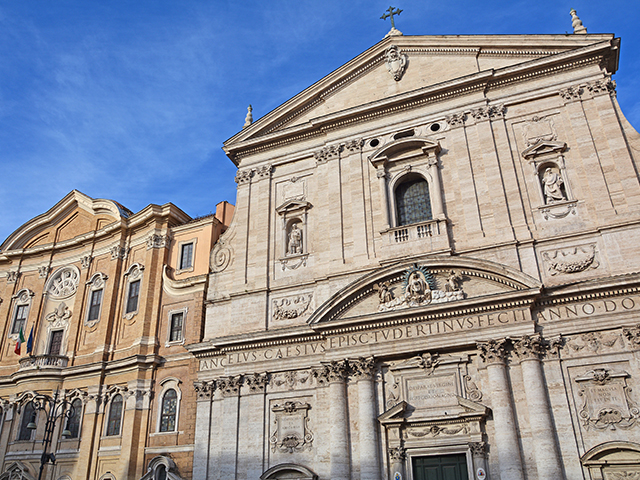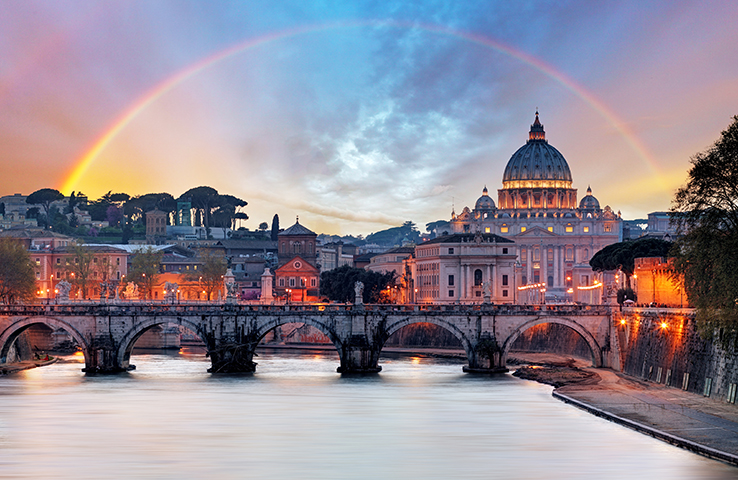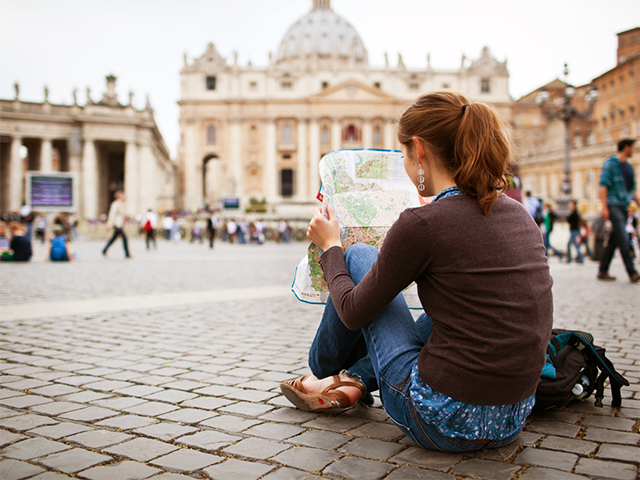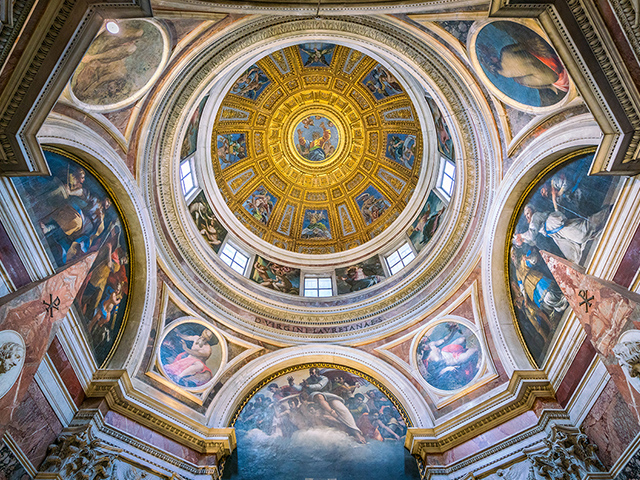Basilica of the Holy Cross in Jerusalem
Visiting the Basilica of of the Holy Cross in Jerusalem: opening hours and useful information to admire the sacred relics and the works housed in one of the Seven Pilgrim Churches of Rome.The Basilica of the Holy Cross in Jerusalem is some hundreds of meters away from metro line A station San Giovanni, from where it can easily be reached going along Viale Carlo Felice, a tree-line avenue that links it to the Basilica of Saint John in the Lateran, in the square with the same name.
The church, that can be accessed from a wide square, is especially well-known because it houses important relics, like many pieces of Christ's Cross, hence its name, in addition to important frescoes, mosaics and a copy of the Holy Shroud.
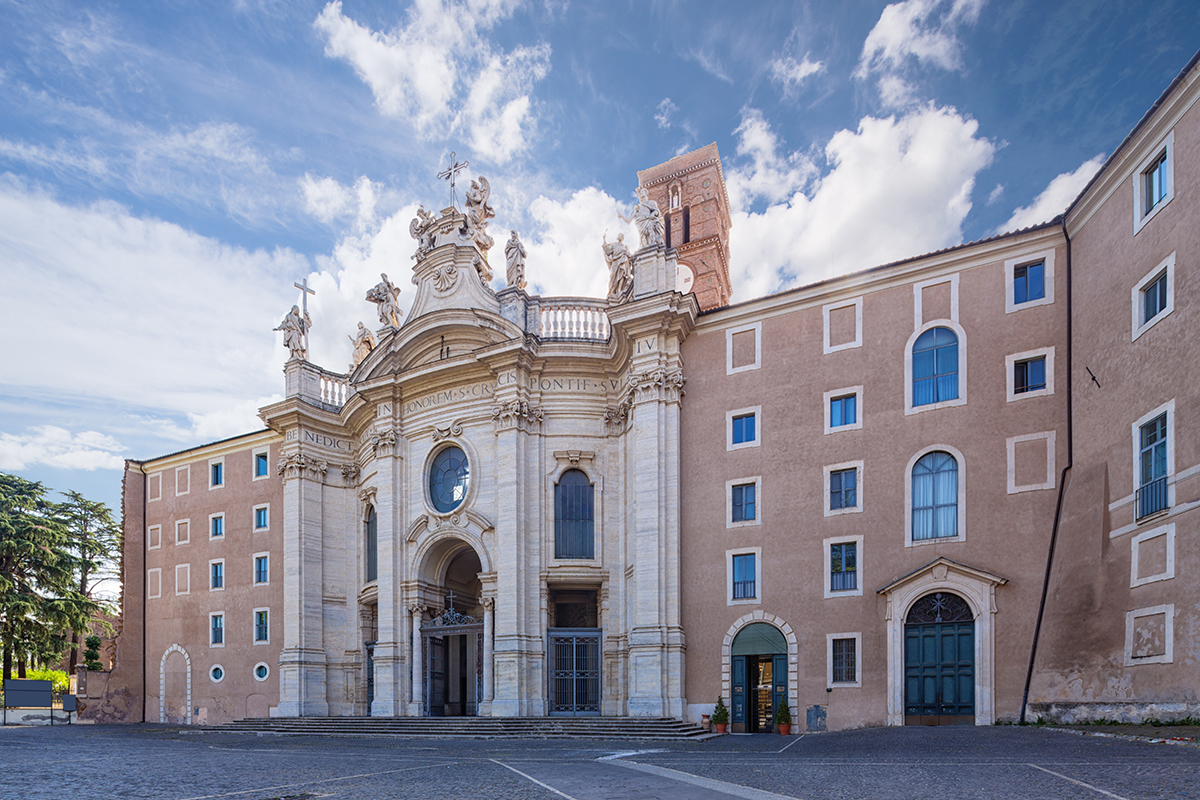
Outside of the Basilica of the Holy Cross in Jerusalem
A LITTLE BIT OF HISTORY
Located in the Esquiline district, next to the Aurelian Walls and the Amphitheatrum Castrense, the Basilica of the Holy Cross in Jerusalem is one of the Seven Pilgrim Churches of Rome, a nearly 20-kilometer pilmgrimage route including the main churches of Rome and that pilmgrims used to cover on foot.
The area where the church is set was previously filled with an imperial building known as Sessorium, residence of St. Empress Helena, mother of Constantine. Around mid 4th century, the emperor himself ordered to build a church in the atrium of the palace to keep the Relics of the Passion of the Lord, which were miraculously found in the Calvary by Empress Helena.
The Basilica has been restored several times, undergoing its first transformation under the papacy of Lucius II, in 1144, when the basilica was divided in three longitudinal aisles and the brick bell tower was added, as well as a portico, placed in front of the 4th-century façade.
The basilica got its present Baroque look in the 18th century under the papacy of Benedict XIV, thanks to the work of architects Domenico Gregorini and Pietro Passalacqua, who built a new façade and totally renewed the indoor space.
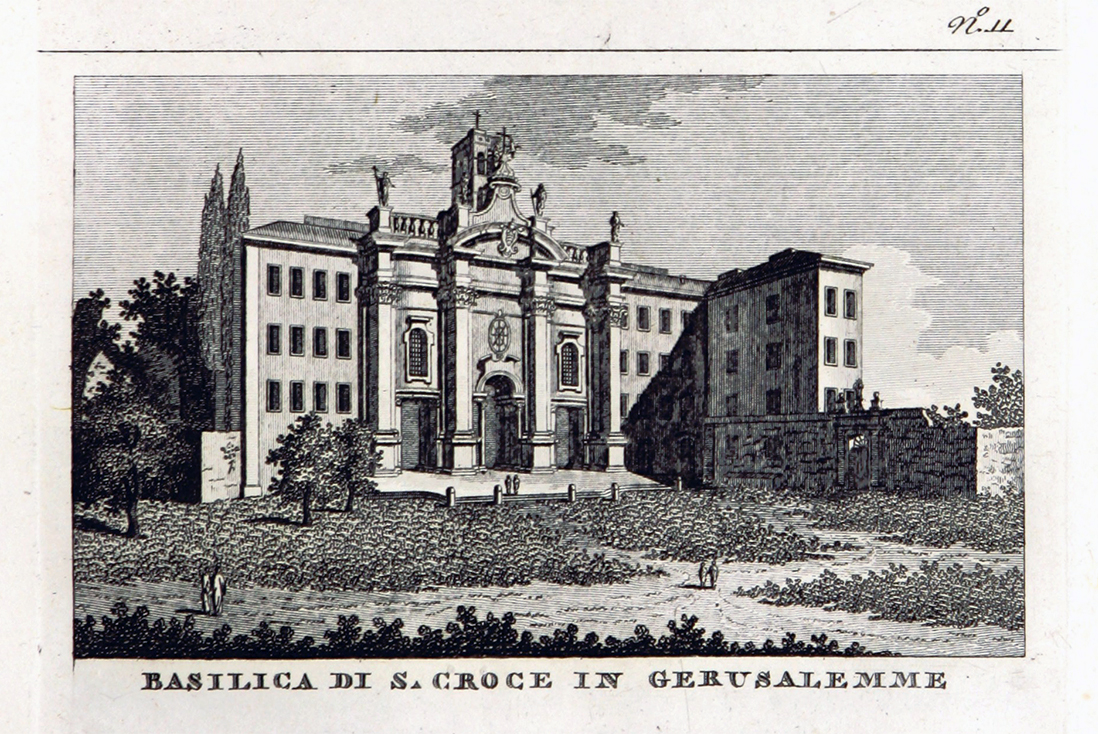
The Basilica of the Holy Cross in Jerusalem in an old illustration
WHAT TO SEE IN THE BASILICA OF THE HOLY CROSS IN JERUSALEM?
As soon as you enter the basilica, you will surely be struck by the wonderful Cosmatesque floor and the 12 colossal marble columns that divide the basilica in three aisles.
Also very suggestive is the wooden ceiling with the Apotheosis of Saint Empress Helena by Giaquinto, same author of the frescoes that decorate the apse and the presbitery, except the Legends of the True Cross, which dates back to the 15th century and is considered a masterpiece by Antoniazzo Romano.
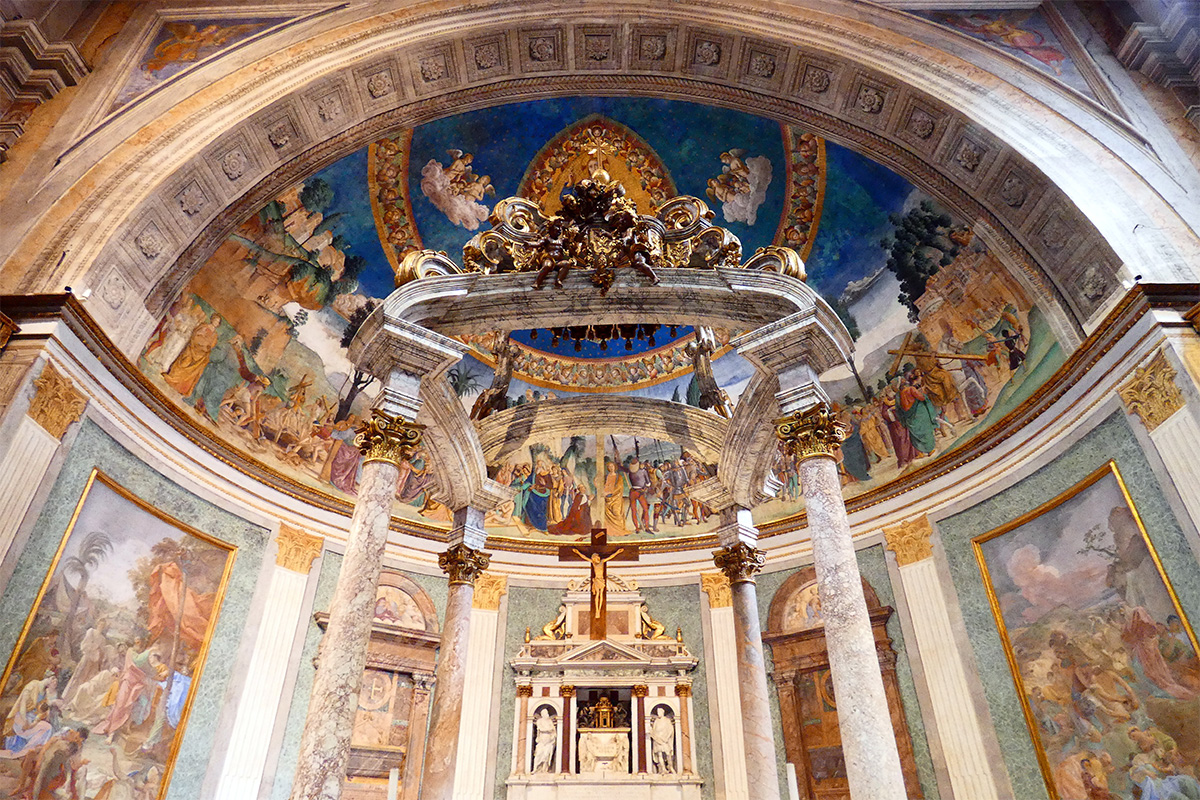
Interior of the Basilica of the Holy Cross in Jerusalem in Rome
From a staircase right to the 18th-century ciborium the small St. Helena's Chapel can be accessed. This chapel preserves underground some soil from the Calvary. On the vault is kept an extraordinary mosaic representing the Blessing Christ, the Evangelists and Histories of the Cross, by Baldassarre Peruzzi according to a design by Melozzo da Forlì.
Finally, going back to the left isle can be accessed the Chapel of Relics, which houses authentic pieces of the True Cross, the cross of one of the thieves, part of the crown of thorns, a holy nail and the Titulus Crucis.
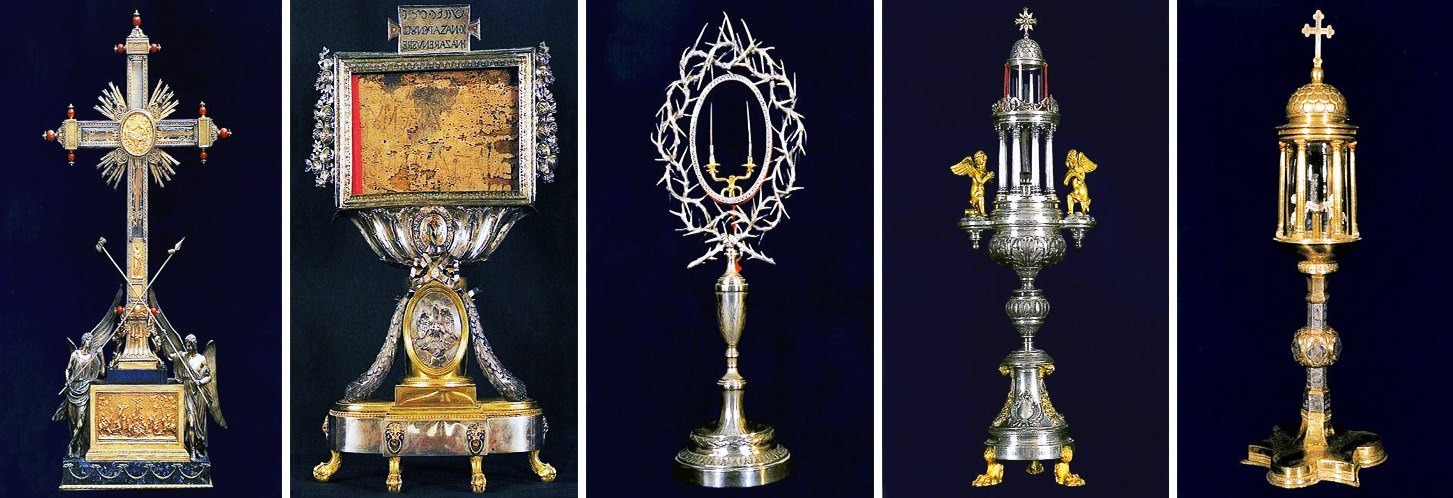
Relics of the Basilica of the Holy Cross in Jerusalem
Even though its authenticity is not completely certain, tradition tells that the relics were brought by St. Helena herself after her trip to the Holy Land.
A curiosity: it seems that other pieces of the cross have been preserved in different churches of the world and other holy nails from crucifixion would be found respectively in the iron crown in Monza, over the main altar of the Milan Cathedral and the cathedral of Colle di Val d'Elsa in the province of Siena.
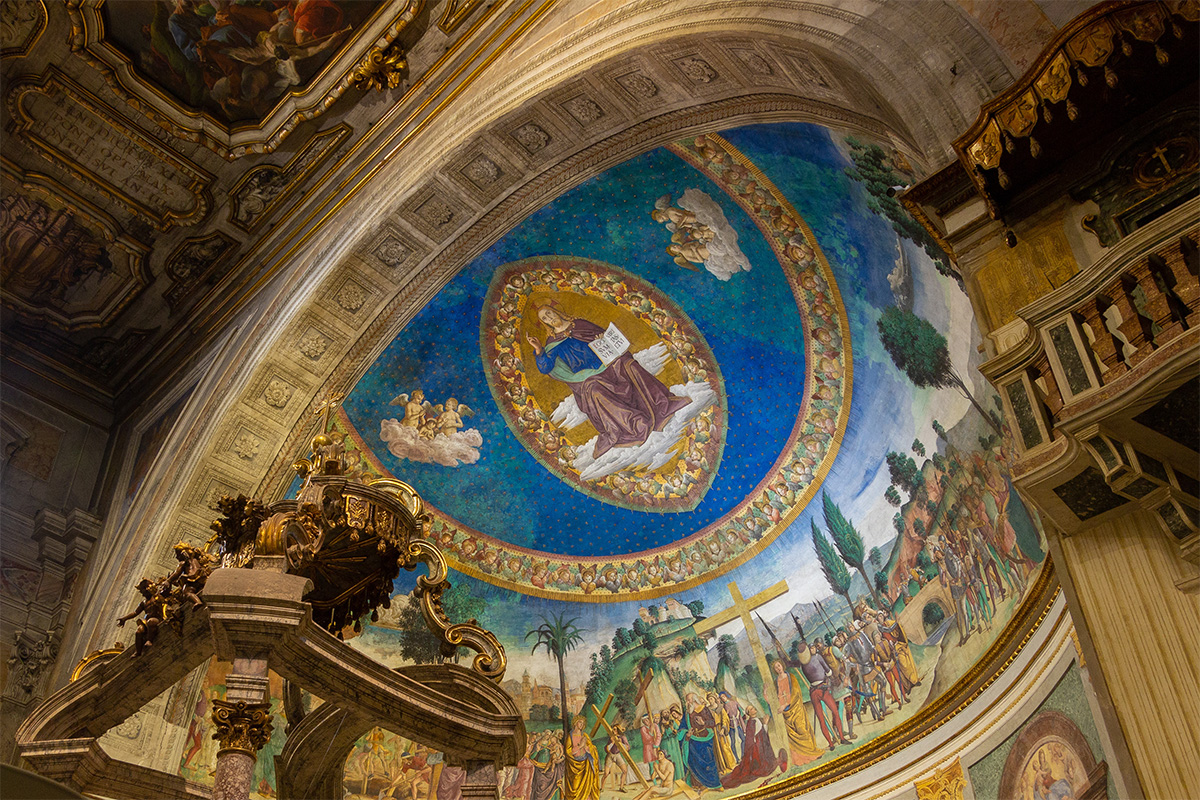
Frescoes in the apse of the Basilica of the Holy Cross in Jerusalem
It is also worth noting the Sessoriana Library, housed in the Monastery, with frescoes by Pannini and the iron and glass gate of the monastic garden, by Jannis Kounellis.
This article ends here. For further information we suggest you to refer to the official site.
Finally, after leaving the Basilica we recommend to you to visit also the National Museum of Musical Instruments, where are displayed unique examples from antiquity to the 20th century. The museum is pretty big, so you should take your time to experience an unforgettable journey into the history of music.
Enjoy your trip!
Useful information
Basilica of the Holy Cross in Jerusalem
- HOW TO GET THERE
- From the Port of Civitavecchia: Get to Civitavecchia Train Station and get on the first regional train bound for Rome. After about 1 hour and 10 minutes get off at Roma Termini and from there, take the metro line A towards Anagnina. Get off after 3 stops at San Giovanni and walk along Viale Carlo Felice. After a few minutes you will be in Piazza della Croce di Gerusalemme in front of the Basilica.*For train timetables refer to Trenitalia official site.
- TIMETABLES
Every day in the following hours 7.00-12.45 | 15.30-19.30
Mass Times:
Working Days: 7.00; 8.00; 18.30
Holidays: 8.00; 10.00; 11.30; 18.30*During the service the visit to the Cappella delle Reliquie and St. Helena's Chapel is not allowed
- PRICES
Free admission



 PORT MOBILITY CIVITAVECCHIA
PORT MOBILITY CIVITAVECCHIA










